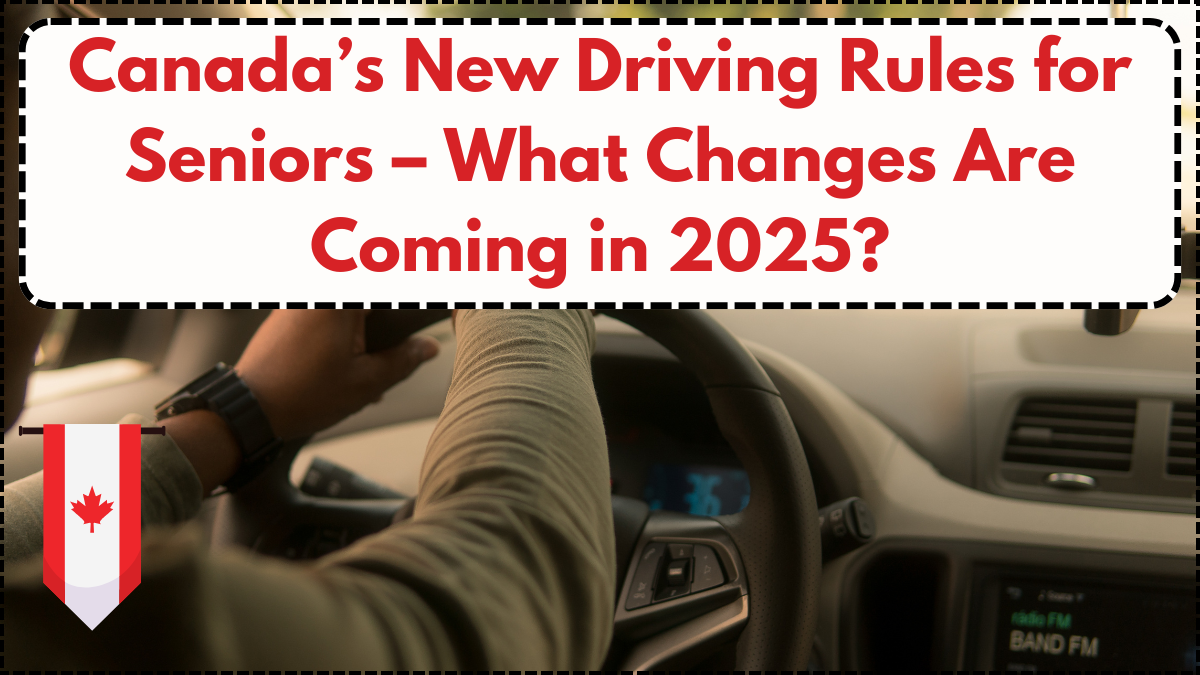Beginning June 2025, Canada’s new driving rules for seniors will roll out nationwide. This marks one of the most significant updates to age-related driving regulations in over a decade. Aimed at improving road safety while respecting senior independence, these changes are based on new health data, accident trends, and recommendations from transportation and medical experts.
The Canada driving rules update affects license renewal intervals, mandatory medical assessments, vision and cognitive testing, and conditional licensing for certain age brackets. As of June 1, 2025, all provinces are required to adopt minimum national standards, though local variations may still apply.

What Are the New Senior Driving Laws?
Under the new senior driving laws, drivers aged 75 and over will undergo enhanced evaluations at license renewal. These changes include:
| Age Group | New Requirements Starting June 2025 |
|---|---|
| 75-79 | In-person renewal + vision exam |
| 80-84 | Vision + cognitive screening + medical history check |
| 85+ | Annual renewal + road assessment + full medical report |
The government is introducing a standardized Cognitive Driver Screening Tool (CDST) for seniors aged 80 and above. This tool assesses decision-making, attention span, and memory—factors critical for safe driving. While not a pass/fail test, it helps determine whether more intensive evaluations are needed.
How Canada Road Laws 2025 Prioritize Safety
The Canada road laws 2025 update focuses on balancing safety with autonomy. Transport Canada data shows that drivers over 80 are more likely to be involved in intersection collisions, often due to slower reaction times. By emphasizing early detection of medical or cognitive issues, the system hopes to reduce avoidable accidents.
A new feature being tested in Ontario and British Columbia is conditional licensing—allowing limited driving privileges (e.g., daytime only or within a certain radius) for seniors who pass medical but not full functional evaluations. This offers a flexible solution instead of full license revocation.
Renewal Process Under the Canada Driving Rules Update
The license renewal process for seniors is becoming more personalized. Seniors will receive a notice 90 days before their license expiry with details of their required assessments. Those in rural areas may access mobile testing units, which are being funded as part of a federal accessibility initiative.
Provinces are also launching senior-friendly digital portals where drivers can schedule tests, upload medical documents, and receive personalized driving recommendations. These updates aim to make the renewal process smoother while maintaining strict safety standards.
What Seniors and Families Should Prepare For
Families are being encouraged to talk openly with aging relatives about their driving habits. Health professionals will also have clearer reporting guidelines under the Canada driving rules update, helping identify at-risk drivers earlier.
It’s important for seniors to:
- Stay on top of their eye and hearing checkups
- Keep medical records updated
- Consider defensive driving courses
Organizations like the Canadian Association of Retired Persons (CARP) are offering resources and workshops to help seniors adjust to the new Canada driving rules for seniors.
Conclusion
The new senior driving laws rolling out in June 2025 signal a proactive shift in ensuring road safety for all while respecting the independence of senior drivers. With proper preparation, transparent communication, and support systems, Canada aims to set a gold standard in age-sensitive traffic regulation.
FAQs
What are the new Canada driving rules for seniors in 2025?
Starting June 2025, drivers aged 75+ will need to undergo in-person renewals, vision exams, and additional cognitive and medical checks based on age.
Will seniors lose their licenses automatically at a certain age?
No. Licenses are not revoked based on age alone. Evaluations are used to determine fitness to drive.
Can seniors appeal a license decision?
Yes. There is an appeals process involving additional assessments and, in some cases, a hearing.
Are the new rules the same across all provinces?
Core standards are national, but provinces can add extra requirements.
What is conditional licensing?
It allows seniors to drive under certain restrictions if full driving privileges are not deemed safe.
Click here to know more.
Akesh is a furniture expert with years of experience in design and craftsmanship. Specializing in sustainable materials, he shares his expertise to help people create stylish and functional living spaces.
